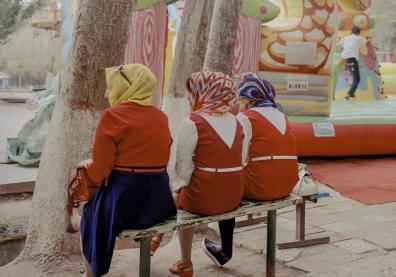Uyghur Decolonial Studies Day

Project explanation
Today, and since 1949, the Uyghur Region has been part of the People's Republic of China (PRC). The indigenous populations, mostly belonging to Turkic groups, the largest of which are the Uyghurs, have been living under Chinese occupation for almost a century. Yet, in academic and journalistic publications, these peoples are often defined as "Chinese minorities" or "ethnic groups of China", and their indigenous territory is almost systematically referred to as "Xinjiang", sometimes even in formulations such as "China's Xinjiang" or "PRC border region". The minorization and enslavement at work in the Chinese colonial project is propagated through publications and presentations internationally, including by "well-meaning" people who position themselves to defend Uyghur rights.
Very often, in academic circles, the use of the term "Xinjiang" to name the land of the Uyghurs is defended as supposedly more "objective" and "neutral" than the terms Uyghur Region or East Turkestan. However, there is nothing neutral about using a Chinese term that literally means "new frontier" or "new territory" to name a territory that is geographically part of Central Asia, has been violently conquered on several occasions by regimes based in China, and whose indigenous Turkic population is today suffering genocide at the hands of colonial authorities. In this case, as in many others, academia reveals the coloniality that is intrinsic to it, and points to the domination it exerts in its efforts to maintain the colonial status quo.
This day is intended for master's and doctoral students in the humanities, social and/or political sciences, as well as journalism, who are interested in the Uyghur question. We propose three decolonial and/or anticolonial interventions by key figures in Uyghur studies, Dilnur REYHAN (indigenous teacher-researcher at INALCO and Sciences Po, President of the Uyghur Institute of Europe), Léo MAILLET (non-indigenous researcher at the University of Geneva) and Sonya IMIN (indigenous researcher at the Université libre de Bruxelles), whose presentation will be interpreted into French by Eleanor HART (non-indigenous researcher, member of IODE).
Program
9:30am - 10:00am: Student welcome, presentations
10:00am - 11:00am: "La minorisation des colonisé.e.s et ses conséquences : le cas ouïghour", by Dilnur REYHAN (CERMOM, Cetobac, IODE)
11:00 - 12:00: Discussions with students, answering questions
Lunch break
14:00 - 15:00:"Surveying Uyghur society, in the PRC and in diaspora: risks, issues and situated point of view", by Léo MAILLET (Unige, Cetobac)
3:00 pm - 3:30 pm: Discussions with students, answering questions
Coffee break
16:00 - 17:30 : Seeing Matters: Visualities and Positionalities in a Uyghur Context, by Sonya IMIN (ULB), interpreted by Eleanor HART (IODE)
17:30 - 18:00 : Discussions with students, answering questions